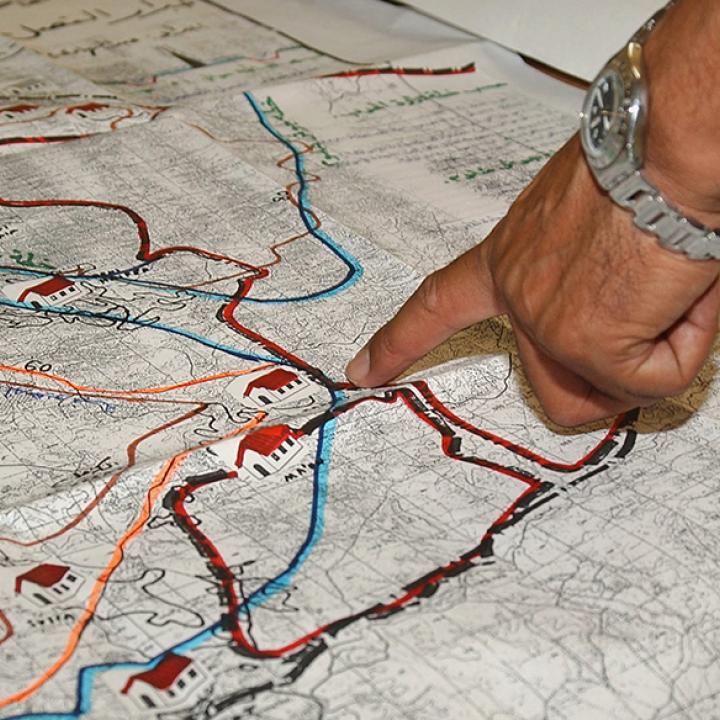
- Policy Analysis
- Fikra Forum
Palestinian Majority Rejects Two-State Solution, But Backs Tactical Compromises

In between the Trump peace plan’s release on January 28 and Israel’s March 2 election, new survey data shows that most Palestinian respondents now say they prefer “regaining all of historical Palestine” over permanent peace with Israel. Yet majorities in both the West Bank and Gaza voice much more pragmatic views about the impracticality of a one-state solution, the return of refugees, or armed struggle against Israel.
This tension and seeming contradiction between relatively moderate short-term popular attitudes and maximalist long-term attitudes should be a foundation for a more effective policy. Such a policy would emphasize current openings for compromise and practical cooperation, while guarding against—and perhaps gradually moderating—future temptations to violence or irredentism. Given these very mixed Palestinian views, it is reasonable to project that a hasty push for a “two-state solution” might not actually produce lasting peace. At the same time, preventing provocative Israeli moves toward annexation would reduce the risk of the popular backlash foreshadowed in these survey findings.
Few still support a two-state solution. Ironically, while some attribute Palestinian rejection of Trump’s plan to its new limits on the traditional two-state paradigm, most Palestinian respondents now reject that model as well. Asked to choose “the top Palestinian national priority during the coming five years,” two-thirds (66%) of West Bankers in this poll pick “regaining all of historical Palestine for the Palestinians”; a mere 14% choose “ending the occupation of the West Bank and Gaza, to achieve a two-state solution.” Gazan respondents, surprisingly, are a bit more moderate: 56% want all of Palestine, while 31% opt for the two-state solution.
These maximalist long-term aspirations are also reflected in responses to other survey questions. For example, when asked about next steps “if the Palestinian leadership is able to negotiate a two-state solution,” just 26% of West Bank respondents say that it “should end the conflict with Israel.” In Gaza, that figure climbs to 40%. Around 60% in both areas say “the conflict should not end, and resistance should continue until all of historic Palestine is liberated.”
Yet no groundswell for one-state solution. At the same time, contrary to common misconception, the idea of a binational state, or a civil struggle for equality, does not seem to be gaining much popular Palestinian support. Only around 10% of respondents in either the West Bank or Gaza say their priority is “achieving a one-state solution, in which Arabs and Jews would have equal rights in one state from the river to the sea.” And only around 10% in either place would prefer to become “a citizen of Israel, with equal rights and responsibilities,” rather than a citizen of a Palestinian state.
Some popular realism on practical options. These views reflect an assessment of the real-world obstacles to any such grand political objectives. Two-thirds of respondents in both the West Bank and Gaza agree with this prognosis: “Israel will never accept a one-state solution that gives the Palestinians equal rights, even if they become a clear majority someday.” Nevertheless, as a practical matter, one-third of West Bank respondents say “it would be better for us if we were part of Israel rather than in PA or Hamas ruled lands.” Among Gazans, that proportion rises to a remarkable 40%.
Resignation on both Palestinian refugees and Israeli settlers. On a related question, 71% of West Bank respondents agree at least somewhat with this prediction: “Regardless of what’s right, the reality is that most Israeli settlers will probably stay where they are, and most Palestinian refugees will not return to the 1948 lands.” In Gaza, that proportion is noticeably lower, but still a bare majority at 52%. And on a personal level, a mere 5% of respondents in either territory say they might actually go to Israel “if you had a choice to move to an equally nice home in Israel, or stay in Palestine.”
Little local support for intifada, but annexation would spur anger. Asked to choose among various responses to their current predicament, only 22% of West Bank respondents would opt to “escalate the resistance or intifada against Israel, even if that makes life harder right now.” But a direct question about responses to possible Israeli annexation moves yields a tougher reaction. A narrow majority (56%) agree that “the Palestinians should focus on opposing any new Israeli attempts to annex any West Bank territory, even by force if necessary”—including 25% who feel “strongly” that way.
Public more moderate than PA on prisoners, normalization. Regarding Palestinian Authority bonuses to convicted terrorists in Israeli prisons, West Bank respondents are strikingly at odds with their political leaders. Two-thirds (68%) now agree at least “somewhat” with this proposition: “The PA should stop special payments to prisoners, and give their families normal social benefits like everybody else—not extra payments based on their sentences or armed operations.” This figure represents a marked increase over the previous three years.
Similarly, West Bank respondents actually reject the official PA policy against “normalization” with Israelis. Again, two-thirds (67%) agree at least “somewhat” with the following statement: “Palestinians should encourage direct personal contacts and dialogue with Israelis, in order to help the Israeli peace camp advocate a just solution.” Among Gazans, that proportion is nearly as high, at 61%.
Methodological note. These findings are from a survey conducted by the Palestine Center for Public Opinion, based in Beit Sahour in the West Bank, comprising face-to-face interviews among a representative sample of 500 West Bankers and 500 Gazans, January 23-February 11, 2020. That survey, sponsored by The Washington Institute, allowed for the author’s travel to the region to personally supervise its launch, helping ensure strict respondent confidentiality, technical proficiency, and quality controls. The margin of error for the separate West Bank and Gaza subsamples is approximately 4%. Additional methodological details are available on request.










